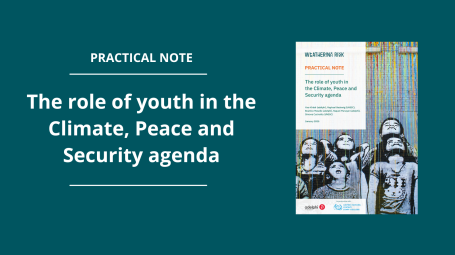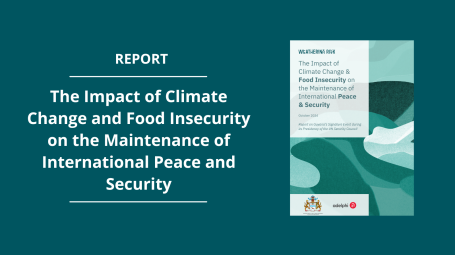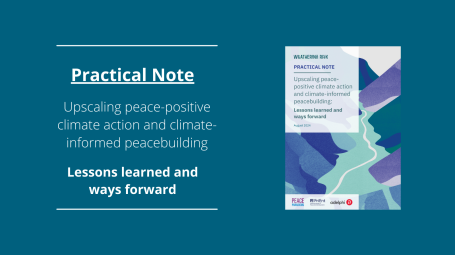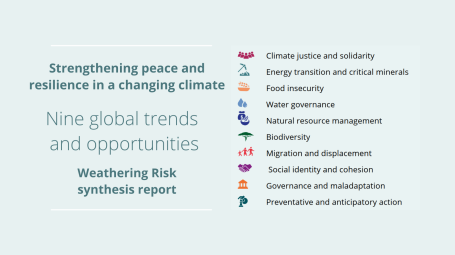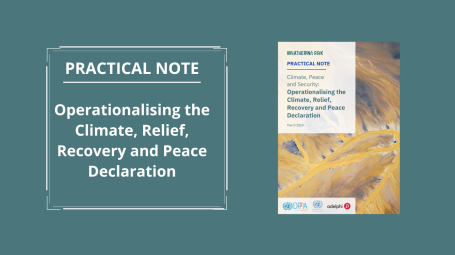-

5 Key Lessons from the Weathering Risk Peace Pillar
This policy brief and policy summary identify 5 key lessons from across the Weathering Risk Peace Pillar projects. These key lessons are distilled from project outcome evaluations and demonstrate how integrated, climate, environment and peace interventions are not only possible, but also make strategic sense. -

Weathering Risk Peace Pillar: Project Evaluation Syntheses
These project evaluation syntheses identify key highlights, lessons and recommendations from outcome evaluations from the first two project phases of the Weathering Risk Peace Pillar projects in the Bay of Bengal, Iraq, Nigeria, Somalia and Yemen. -
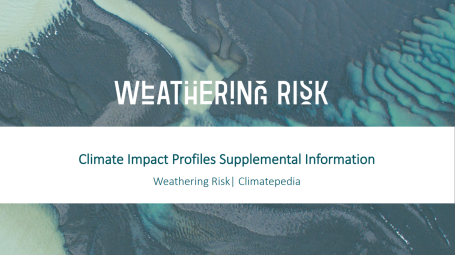
Climate Impact Profile Supplementary Information
These profiles provide forward-looking data on a region's climate – including projected parameters under various emission scenarios across key sectors – with the goal of supporting resilience-oriented short and long-term planning. The following resource serves to elaborate upon the data sources and methods mentioned in Climate Impact Profiles for technical users. -
The Future of UN Peacekeeping in a Changing Climate
Climate change creates significant challenges for UN peacekeeping operations and increases the urgency and complexity of maintaining peace and security in fragile settings. The links between climate change, conflict and peace are becoming increasingly evident, as climate impacts exacerbate resource competition, destabilise communities, and fuel tensions. This policy paper provides recommendations for integrating climate change considerations into UN peacekeeping missions. -
The role of youth in the Climate, Peace and Security agenda
This practical note provides a synthesis of the discussions that took place on the sidelines of the Berlin Climate and Security Conference 2024. It makes the case for the centrality of the meaningful participation of youth in the Climate, Peace and Security agenda. It outlines challenges, emerging good practices and recommendations for the UN system, member states, donors, researchers and practitioners. -
The Impact of Climate Change & Food Insecurity on the Maintenance of International Peace & Security
Conflict, climate extremes and economic shocks are fueling an unprecedented food crisis. This report summarises the UNSC High-level Open Debate on climate change, food insecurity and the maintenance of international peace convened by Guyana. It dispells common myths and proposes operative measures for the wider UN system, international organisations, Member States and civil society. -
Upscaling peace-positive climate action and climate-informed peacebuilding: Lessons learned and ways forward
Currently, 90% of climate finance targets middle-income, high emission-producing countries leaving conflict-affected regions underfunded and vulnerable. This practical note captures 8 key takeaways on peace-positive climate action and climate-informed peacebuilding and provides recommendations for multilateral and bilateral donors, policy-makers and practitioners. -
Strengthening peace and resilience in a changing climate: Nine global trends and opportunities
The Weathering Risk synthesis report identifies nine pressing global climate security trends and opportunities based on 43 case studies, assessments, mapping exercises and scenario-based analyses produced during the first phase of Weathering Risk. -
Operationalising the Climate, Relief, Recovery and Peace Declaration
Climate finance for fragile and conflict-affected contexts continues to fall short. Although extreme weather events affect three times as many people in fragile and conflict-affected states annually compared to other countries, they receive up to 80 times less climate finance. This practical note provides guidance for actors to deliver peace-positive climate action and climate-informed peacebuilding in fragile and conflict-affected contexts.



